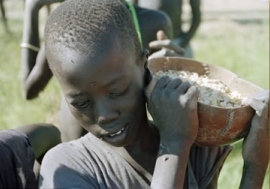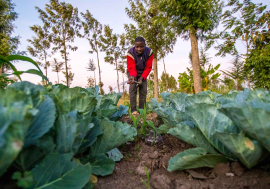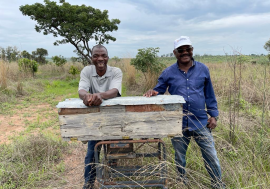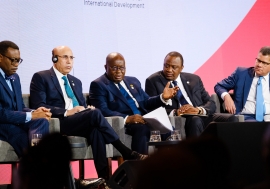Anchor the MDGs to economic progress, Africans say
Anchor the MDGs to economic progress, Africans say
 Bean packing enterprise in Ethiopia: Although more African countries have been registering stronger economic growth, poverty remains persistent.
Bean packing enterprise in Ethiopia: Although more African countries have been registering stronger economic growth, poverty remains persistent.For 17 years Peter worked as a machine operator in a South African textile plant. It was not high-paying work, but it paid the bills and kept his family above the poverty line. When he lost his job because foreign imports were cheaper, he told University of KwaZulu-Natal researcher Claire Ichou, he was plunged into poverty — and despair. "Peter explains very painfully how he has lost his dignity," she wrote in an academic paper. "He declares that his wife does not respect him. He tells us that his children are starving." In Peter's eyes, she continued, "a man without a job is not a man and there is nothing he can do. He has no status."
As the world enters the final phase of the drive to reach the Millennium Development Goals (MDGs) — ambitious targets for slashing poverty, improving health and education, empowering women and protecting the environment by 2015 — African leaders and UN development experts are starting to focus on the economic underpinnings of sustainable progress. Lifting the most destitute out of poverty, they note, will require greater investments in agricultural and industrial production, greater job creation and policies that favour economic growth. A number of analysts argue that while the MDGs have succeeded in mobilizing both financing and political will for vital social services for the poor, they do not adequately address the underlying economic and social causes of poverty, disease and conflict (see Wanted: fresh ideas for combating African poverty and Jobs and equity key to Africa's poverty fight).
The links between the MDGs and faster, more equitable economic growth and development were frequently emphasized by African political figures and economists at the 20–22 September MDG summit at UN headquarters in New York. Malawi's President Bingu wa Mutharika, who also serves as chair of the African Union (AU) this year, told world leaders, "For Africa as a whole, we strongly appeal to the United Nations to review the supply side [of development] to improve access of ordinary people, especially women and children, to the services envisaged under the MDGs. Most MDGs depend on the availability of more schools, more hospitals, more rural infrastructures, more boreholes, dams and wells, more trained teachers, doctors, nurses, agronomists, scientists…. Let us pay attention to the supply side if we are to meet these goals."
A fishing industry, not fish
"Inclusive Growth and Employment in Africa," a leadership panel sponsored by the Tanzanian, Liberian and Danish governments on 22 September, highlighted the need to strengthen the economic foundations of the MDGs. UN Development Programme Administrator Helen Clark noted that high growth rates in many African countries over the decade to 2008, driven largely by higher world commodity prices, failed to dent high unemployment rates or significantly reduce poverty. Harnessing economic development to the MDGs, she said, would require new macroeconomic policies that emphasize long-term growth, job creation, diversification, industrialization and higher productivity.
 Africans know how to fish, says African Development Bank President Donald Kaberuka, but they need help in building a fishing industry.
Africans know how to fish, says African Development Bank President Donald Kaberuka, but they need help in building a fishing industry.Tanzanian Prime Minister Mizengo K. Peter Pinda told the audience that creating jobs and opportunities in the countryside is critical to Tanzania's progress on the goals, since the majority of his citizens make their living from the land, and farm incomes are well below the poverty line. Danish Prime Minister Lars Løkke Rasmussen agreed. Noting that progress on the MDGs means that more children are living to grow up and attend school, he then asked, "But grow up to what? … As partners in development we must … make sure that growth supports freedom and opportunities for the individual to escape poverty." Tanzania alone, he continued, needs to create 700,000 new jobs every year just to keep pace with the number of young school-leavers entering the work force.
Donald Kaberuka, president of the African Development Bank, received the loudest applause when he observed that when donors first began aid programmes in Africa, "they brought us fish, but we told them we had fish. Then they came to teach us how to fish, and we told them we already knew how to fish." What Africa needs today, Mr. Kaberuka said with a smile, is for its partners to "help us build a fishing industry" that supports processing and packing industries, generates steady jobs, links up with other parts of the domestic economy and improves African competitiveness in the global marketplace.
'Take full ownership'
Such a focus on employment and economic development has grown more important in the wake of the global economic crisis and the failure of Africa's traditional donors to honour pledges to double development aid to the region. President Paul Kagame of Rwanda told the MDG Summit that "the MDGs must remain the international priority." But he underscored the importance of Africa's charting its own path: "The debate on the MDG agenda has, at times, been dominated by a few voices, primarily from the developed nations and affiliated non-governmental organizations. Despite their good intentions, their perspective is often predicated on paternalism not partnership, on charity not self-reliance, and on promises unfulfilled rather than real change."
President Kagame continued, "We can no longer rely on the goodwill of other nations — we neither need to, nor should want to. We must assume effective leadership, take full ownership of the development of our countries and truly deliver for our citizens."
'Repositioning' the MDGs
Supachai Panitchpakdi, the secretary-general of the UN Conference on Trade and Development (UNCTAD), cautioned that expanded social services, while important, are not sustainable without a firm economic base. Addressing delegates at the opening of the summit, the former World Trade Organization head said that "lack of productive investment and the persistence of employment in low-productivity activities have kept incomes low and restricted economic diversification in many developing countries," putting the MDGs beyond their reach.
Excessive emphasis on social services, along with widening social and economic inequality, Mr. Panitchpakdi continued, require "repositioning the MDGs within a broader development framework. Such a framework emphasizes investment, especially in productive capacity, an equitable distribution of resources, policy space, and sustainable employment generation as the main drivers of poverty reduction."
He concluded, "One reason we risk missing many MDG targets is that the economic model that underpinned them has, I believe, been indifferent to the kind of values behind a 'sufficiency economy'" that provides a decent living for all. "To match the vision demonstrated back in 2000 and meet the MDGs — whether by 2015 or after — we must again find the courage and ambition to change the path of our economic development."



















